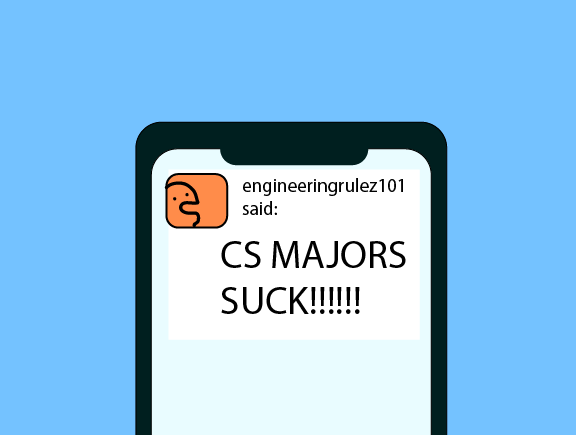Opinion | Major elitism is a major problem
Nov 3, 2022
No one should ever feel ashamed of what they choose to study during their time here at the University. To say that some majors are “better” than others runs counter to what the point of college is.
People tend to be naturally competitive, and this goes doubly at this institution, where admission into specific programs like engineering and computer science often dip into single-digit acceptance rates. It’s a point of pride for some people, and with good reason. It takes hard work to secure a spot.
But that doesn’t give anyone a right to make another person’s field of study — another person’s passion — the butt of jokes, or a trivial point of comparison a la “my workload is harder than yours,” just to feel a sense of superiority. The fact of the matter is that college is hard for everyone.
Anyone can opt to have a difficult course load. It’s just that the core curriculum for many prestigious majors is naturally difficult by design. A lazy engineer is a hazard, which is why weed-out courses exist. But technically, there’s nothing stopping a journalism major from taking chemistry and physics in the same semester.
Maybe this journalism major wants to challenge themselves, or they want to study patent law and are double majoring in journalism and chemistry. Majoring in the humanities doesn’t equate to a lack of intelligence, and majoring in a STEM field doesn’t automatically make you more intelligent.
Get The Daily Illini in your inbox!
To be a computer science student, in many cases, requires a holistically impressive resume: good grades, good test scores and maybe a CS-adjacent extracurricular activity. But many of them had a plan going in — they wanted to major in CS. In many ways, placement in that program is more or less a show of preparedness, not necessarily intellectual betterment.
It’s great when your passions perfectly align with a prestigious major and a high-earning job offer, but many of us don’t have that luxury. Asking high school students if they are sure of what they want to study and willing to challenge themselves by taking several levels of calculus and self-studying for Advanced Placement exams is, well, a big ask.
It’s not uncommon for people who were successful in high school to currently be undeclared.
It goes further. Last summer, there were debates about the information sciences major on Reddit, in which people argued whether the IS major was worthwhile due to its poor job prospects compared to any of the computer science programs here. Comparisons like this make no sense.
These are completely different majors whose goals are to teach different things. Computer science teaches computer science, while the field of information sciences consists of information technology with a technology-based slant. It’s obvious: one shouldn’t become an IS major and expect a technical or wholly computer science-based curriculum. That’s not what the program is designed to teach.
And yet, many of the career placements are the same because information sciences majors can opt to take technical electives just like anybody else.
What’s the point of this absurdity? We may have heard the jokes about how majoring in gender studies is useless and how political science majors will end up unemployed and how philosophy majors become baristas.
Even if it’s all in good fun, these kinds of jokes hurt people. They ruin people’s confidence and self-image and make them reconsider what they want to study. These trivial comparisons are unproductive and go against the collaborative and non-cutthroat culture that makes the University of Illinois so appealing to those searching to study their interests. It’s purely immature.
Maybe I come from a place of privilege to have this worldview, but work isn’t the be-all and end-all. The point of a university education isn’t necessarily to gain vocational knowledge designed to help you succeed in the workforce. Rather, it’s to have an enriching experience and to gain skills that help you become a fuller person.
Raphael is a freshman in LAS.






